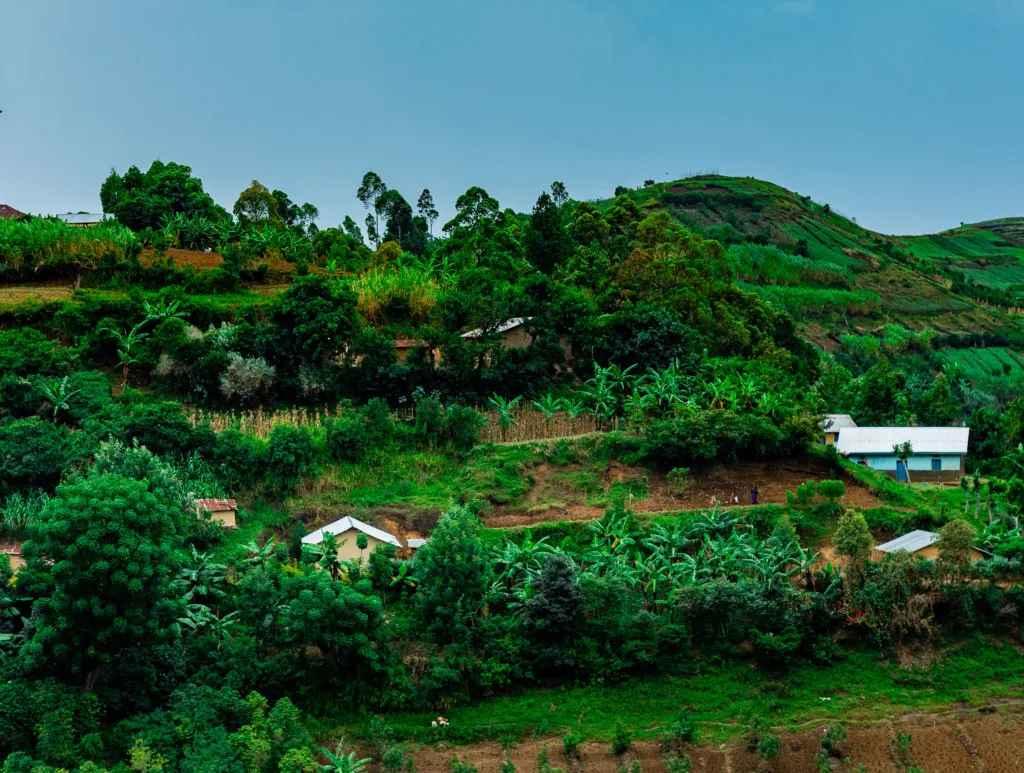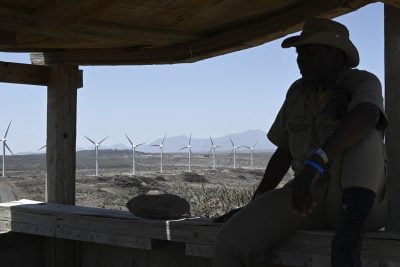Coffee has rarely been out of the headlines in Uganda this year. In February the finance ministry signed an agreement with the Uganda Vinci Coffee Company – a mysterious firm, led by an Italian businesswoman, which promised to build a factory processing 60,000 tonnes of coffee annually.
The deal sparked outrage, not least because it gave Vinci huge tax breaks and priority supply. In May a parliamentary inquiry found that the deal was “unconstitutional, illegal, void and unenforceable”, and parliament voted to terminate it.
How can Ugandans benefit from the coffee they grow?
In June, in his state of the nation address, President Yoweri Museveni hit back.
“The continued export of raw materials by Africa is the new form of slavery,” he said, explaining why he was willing to offer such generous incentives for the processing factory. “The farmers are now cheated because the biggest beneficiaries from our coffee are the external roasters, grinders and packers of coffee.”
Although there was suspicion about the president’s real motives, few could dispute the point he was making. Uganda is Africa’s largest coffee exporter by volume, which earned it $627m in 2020/21. Yet most of the value is captured elsewhere, in an international market dominated by European and American traders.
In a cup of coffee sold for £2.50 ($3) in the UK, just 10 pence is spent on the coffee itself and only a single penny of that goes to the grower, according to the International Trade Centre, a multilateral agency.
The Vinci deal may not be the solution to that problem, but the fallout might focus minds on a deeper question: how can Ugandans benefit from the coffee they grow?

Coffee and capital
The structure of the Ugandan coffee sector today is largely the outcome of free-market reforms in the 1990s, which went further than anywhere else in Africa. In a few tumultuous years, the government dismantled the institutions that had once organised rural life: the state-run Coffee Marketing Board and co-operatives, through which farmers had accessed markets, training and credit.
As a result of the reforms farmers got a bigger share of the export price, but were also left in the hands of extortionate middlemen, who sometimes cheat them with rigged weighing scales. The middlemen sell in turn to the multinational companies who dominate the export trade – including Kyagalanyi, owned by London-based ED&F Man, Ugacof, owned by Geneva-based Sucafina, and Kawacom, a subsidiary of ECOM Agroindustrial, another Swiss firm.
“The middlemen take advantage of the poor farmers: they give them peanuts,” argues Nandala Mafabi, an opposition politician and chairman of the Bugisu Co-operative Union, one of the few co-operatives to survive. As for the multinationals, “the role they are playing is to take the profits out.”
The liberalisation of domestic coffee marketing was paralleled internationally by the collapse of the quota system under the International Coffee Agreement in 1989, which tilted the balance of power away from producer countries.
Today the value chain is controlled not by those who grow the coffee, but by those who hold capital – a dynamic which percolates right back down to the farm, where middlemen who receive cash advances from multinational exporters can elbow out credit-starved co-operatives.
Adding value to Uganda’s coffee
The challenge for the government is how to bring some structure back to the sector. In 2017 it developed a “coffee roadmap” with ambitious goals that included the tripling of yields, revival of farmer groups, and an increase in annual production to 20m bags by 2030.
“All those initiatives are looking at how we can increase exports, how we can increase the quality, and ultimately bring more value to the economy,” says Emmanuel Iyamulemye Niyibigira, the managing director of the Uganda Coffee Development Authority (UCDA), which regulates the sector.
Annual coffee exports, which have fluctuated between about 2m and 4m bags since independence, reached a record 6.5m bags in 2020/21. The rise has been attributed to the distribution of free seedlings by the government and an expansion of acreage, helped by bountiful rains.
And that is not all. “Rather than looking only at production we are also focusing more on value addition in the next five years,” says Iyamulemye.
He explains that one aspect of value addition is nudging farmers into hulling their coffee, rather than simply selling the dried cherries, known in Luganda as kiboko.
Another is to encourage investment in roasting facilities. There are now 47 roasters in Uganda, although 95% of the country’s coffee continues to be exported as green beans.
A contentious deal
That is where the Vinci coffee deal came in. The plan to build a coffee processing factory was reportedly orchestrated by Museveni himself, behind the backs of everyone in the coffee sector including the agriculture minister, who publicly declared that his ministry was not privy to the agreement.
As Museveni told it, he met Italian businesswoman Enrica Pinetti and “asked her to look into coffee”, even though “she had no idea” about the sector. Sceptical Ugandans noted that this was the same Pinetti who was awarded a lucrative government contract to build a hospital on the edge of Kampala, where nothing more than the foundations have been laid.
She did not show up when called by the parliamentary committee probing the coffee deal; her representatives said she was meeting the president at the time.
Meanwhile one of the most hotly disputed clauses in the leaked agreement promised Vinci “priority supply of coffee”, to the consternation of others in the trade.
“Coffee is not government property,” says Robert Waggwa Nsibirwa, the president of the Uganda Coffee Federation, an industry body, and a minister in the Buganda Kingdom, which was critical of the deal. “It’s my coffee. It’s my two bags. You can’t tell me where to sell it.”
What is the right focus for Ugandan coffee?
Others ask whether the pursuit of coffee roasting is the right focus for Uganda right now.
“Let us first get a clear understanding of which market we are serving and what value they want,” argues Robert Kabushenga, a former CEO of the Vision Group media conglomerate, who now runs his own coffee farm.
“We could destroy a lot of value by trying to enter the roast coffee market as it stands today. That market is dominated by Germans, Dutch, Swiss and Americans.”
He points out that consumers want freshly roasted coffee, which means roasters need to be close to target markets or have excellent logistics.
“The reason Germany and Switzerland make a lot of money out of coffee is because they’ve mastered the logistics of doing that work,” he says, arguing that the focus for Uganda in the medium-term should be instant coffee for African markets.
One Ugandan coffee company that is exploring that potential is Star Café, which sells a range of instant and roasted coffee brands within Uganda itself.
“The market for coffee has really grown,” says Esther Kamiza, its chief executive. “We have more coffee houses compared to ten years back… Ugandans love their instant coffee but right now we are trying to encourage people to also appreciate and buy the roast and ground coffees.”
Star Café has also sold its coffee to UN missions in other African countries, from Liberia to Sudan. But breaking into international markets is hard, says Kamiza, because of high tariffs on processed coffee, complex certification requirements, and the trend towards freshly-roasted beans.
“The export market could be there but it is still a work in progress,” she says.
Africa needs its own coffee organisation
The debate over the Vinci deal came soon after Uganda’s withdrawal from the International Coffee Organisation (ICO), an intergovernmental body whose members account for 93% of world coffee production.
The ICO has become “just a forum for talking and talking without tangible benefits” which is “shifting more for the multinationals and not serving the members”, says Iyamulemye. In an earlier written statement he said that the ICO was not doing enough to enable value addition or mitigate price volatility, and raised concerns about how coffees are classified.
The thrust of that critique is valid, says Jane Nalunga, executive director of the Southern and Eastern Africa Trade Information and Negotiations Institute (SEATINI), a civil society group in Kampala. “We need our own coffee organisation in Africa,” she argues. “We don’t need a coffee organisation based in London.”
But she questions whether Uganda’s unilateral withdrawal will achieve much. “Sometimes it’s better to negotiate from the inside,” she says.
In a statement the ICO said that it had never received proposals for change from Ugandan authorities, quoting a proverb that “you cannot claim your share of the meal while you are not at the dinner table”.
Uganda’s smallholders need better access to finance
All this furore has distracted from more basic priorities, like improving the productivity of the smallholder farmers who grow the bulk of Uganda’s coffee crop. Most of them reap less than half a kilogram of coffee per tree, far lower than yields in Brazil or Vietnam.
One major obstacle is the lack of access to affordable finance, without which farmers cannot buy inputs like fertiliser and herbicides, argues a recent report by the Centre for Development Alternatives, a Kampala-based think-tank, and the Konrad Adenauer Stiftung, a German foundation. Banks tend to congregate in towns, far from farmers, and do not tailor their products to the needs of smallholders.
“Overcoming the constraints that limit delivering finance to smallholder farmers will require de-risking the process,” argues Michael Mugisha, one of the co-authors of the report. “It’s possible, it can be done, with a combination of leveraging co-operatives, integrating digital technology but also [using] risk guarantees.”
There is much to be gained by getting that right. More than a million Ugandan households grow coffee, which is also the country’s biggest export.
Meanwhile, as Kabushenga points out, there is one positive effect of the Vinci deal that everyone can agree on: “to make coffee a matter of national debate”.
Want to continue reading? Subscribe today.
You've read all your free articles for this month! Subscribe now to enjoy full access to our content.
Digital Monthly
£8.00 / month
Receive full unlimited access to our articles, opinions, podcasts and more.
Digital Yearly
£70.00 / year
Our best value offer - save £26 and gain access to all of our digital content for an entire year!
 Sign in with Google
Sign in with Google 



